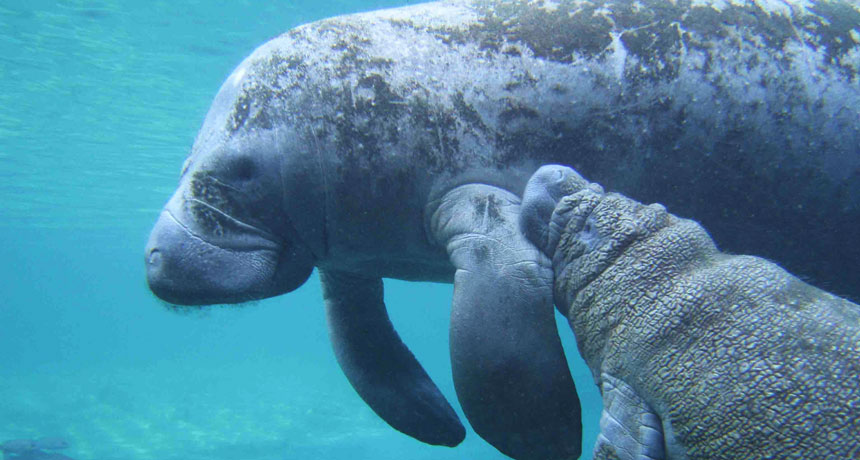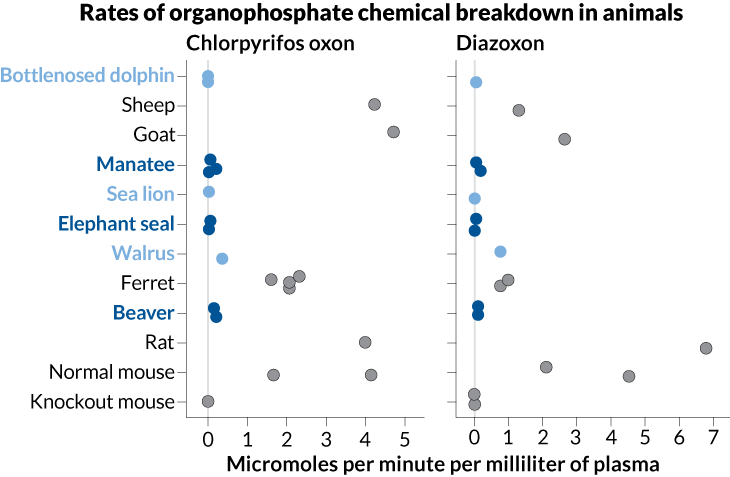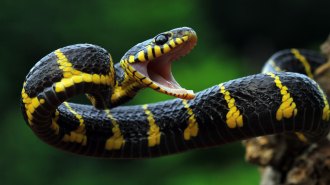
GHOST GENE The ancestors of manatees and other marine mammals lost working versions of certain genes millions of years ago. One of those genes protects land mammals against some harmful pesticides.
Robert K. Bonde/USGS–Gainesville
A gene that helps mammals break down certain toxic chemicals appears to be faulty in marine mammals — potentially leaving manatees, dolphins and other warm-blooded water dwellers more sensitive to dangerous pesticides.
The gene, PON1, carries instructions for making a protein that interacts with fatty acids ingested with food. But that protein has taken on another role in recent decades: breaking down toxic chemicals found in a popular class of pesticides called organophosphates. As the chemicals drain from agricultural fields, they can poison waterways and coastal areas and harm wildlife, says Wynn Meyer, an evolutionary geneticist at the University of Pittsburgh.
An inspection of the genetic instructions of 53 land mammal species found the gene intact. But in five marine mammal species, PON1 was riddled with mutations that made it useless, Meyer and colleagues report in the Aug. 10 Science. The gene became defunct about 64 million to 21 million years ago, possibly due to dietary or behavioral changes related to marine mammal ancestors’ move from land to sea, the researchers say.
The team also gauged the rate at which two organophosphate chemicals — chlorpyrifos oxon and diazoxon — broke down in blood samples from five land mammal species and six marine or semiaquatic mammal species. While blood from the terrestrial species, including sheep, goats and ferrets, showed a decrease in toxic molecules over time, the marine species’ blood showed almost no change. Mice genetically engineered to lack the gene couldn’t break down the chemicals either.
No show
Blood samples from marine and semiaquatic mammals (blue) with a faulty version of a gene called PON1, as well as a mouse with the gene knocked out, showed that most of the animals didn’t break down two organophosphate pesticide chemicals — chlorpyrifos oxon and diazoxon. Land mammals with a working version of PON1 better metabolized the compounds.

A nonfunctional PON1 doesn’t necessarily mean marine mammals are helpless against organophosphates, says environmental toxicologist Andrew Whitehead at the University of California, Davis who was not involved in the work. The animals may have other defense mechanisms, but in this study, “they aren’t stepping up to the plate to metabolize these organophosphates,” he says.
It’s unclear if organophosphates build up in marine mammals’ bodies in a way similar to DDT, a type of pesticide that doesn’t break down easily in the environment. DDT, which is banned in dozens of countries, can accumulate in marine mammals’ tissues and cause nervous system damage and birth defects (SN Online: 1/19/16).
What’s more, “even though organophosphates don’t stick around as long in the environment as DDT, there’s persistent input,” Whitehead says. The chemicals are often used on crops and to kill mosquitoes and other pests.
The researchers plan to collect blood samples from dolphins and manatees in coastal areas suffused with agricultural runoff, says study coauthor Nathan Clark, an evolutionary biologist also at the University of Pittsburgh. That could help scientists monitor if the animals have been exposed to the pesticides and if that corresponds with levels of the chemicals in the environment, he says.
Editor’s note: This story was updated August 17, 2018, to correct the number of marine mammal species with a mutated PON1 gene.







